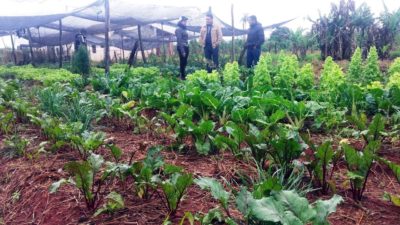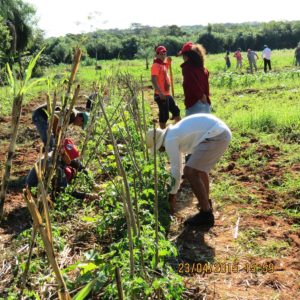A Farmer-Led Vision for a New Food System in Paraguay

The industrial agriculture model is only about 60 years old, but has already had a tremendous impact on the earth. It has contaminated water sources, replaced tens of thousands of seed varieties with a dozen cash crops, diminished soil fertility around the world, contributed to global inequality, and annually contributes between 44 and 57% of global greenhouse emissions, exacerbating climate change. Perhaps most critically, the industrial agricultural model exploits farmers and farm workers alike, exacerbating rural poverty and undermining food sovereignty.
But there’s a powerful movement growing in to combat industrial agriculture and the multinational corporations that profit from it. La Via Campesina (LVC), an international alliance of some 200 million families and their organizations, are building a new vision. Their vision puts people first, centering communities and their need for healthy, culturally appropriate food. Instead of exploitative farming practices, they advocate for agroecology and a robust food web that nourishes people and the planet. Their goal: a new kind of food system.
Ecological agriculture, or agroecology, is the key element of this broad effort to transform agriculture. Applying ecological principles to agriculture emphasizes the need for internal inputs, nutrient cycling, energy efficiency, and traditional knowledge in an effort to foster greater autonomy of farmers. Agroecology reduces farmer dependency on costly, petroleum-based farm inputs and market fluctuations. Agroecology also defends peasant wisdom and traditional agricultural systems, most of which have been sustainable for over hundreds or thousands of years. Agroecology is more than a series of farming methods, but a global movement of farmers, scientists and advocates.
Scaling Out Agroecology Through Farmer-to-Farmer Training Centers
Member organizations of La Via Campesina have built (or are currently building) some 40 agroecology schools —ranging from informal farmer training centers to more formal universities—all created and directed by the rural organizations themselves. Among their objectives, the schools have come to combine the tradition of popular education with the farmer-to-farmer methodology.
Support for farmer-to-farmer trainings is core to Grow Ahead’s mission to support farmer-led projects. The farmer-to-farmer movement is based upon community empowerment, traditional knowledge, and local innovation and cooperation. Farmer-to-farmer trainings are the most effective and culturally appropriate method to “scale out” agroecology. For all those reasons, Grow Ahead has teamed up with the Latin American Institute of Agroecology (IALA) Guaraní to support the development of an agroecology training center in Paraguay.
Learn more about this campaign, and support here.
Paraguay: Hopes for a Path Away from Industrial Agriculture
Paraguay is one of the smallest countries in South America. The mainstay of the country’s economy is agriculture and livestock, primarily soy and beef, which comprise nearly 80 percent of total exports. Paraguay is the world’s fourth largest exporter and sixth largest producer of soy. While agriculture is the basis of its economic growth, poverty is three times higher in rural areas than in urban areas.
Land is more inequitably distributed in Paraguay than anywhere else in Latin America. A census in 2008 revealed that 80 percent of agricultural land is held by just 1.6 percent of landowners, with the 600 largest properties occupying 40 percent of the total productive land. This means that more than 300,000 family farmers have no land at all, which is a significant driver of rural poverty.
As a result, Paraguay is plagued by a history of brutal violence over land ownership. Over 130 small-scale farmers have been murdered there since the end of the Stroessner dictatorship, the vast majority over conflicts to defend land rights.
Yet, despite difficult circumstances, small-scale farmers in Paraguay are organizing to build a new path forward.
Take Action
Grow Ahead has launched a campaign to support the development of an agroecology center in Paraguay in partnership with La Via Campesina. We are raising $20,000 to train dozens of farmers, including 37 agroecology university students, and support the establishment of an aquaculture training program and other agroecological activities.
By supporting peer-to-peer training in rural areas, we can help rural communities build food sovereignty, grow food security, and tackle rural poverty.